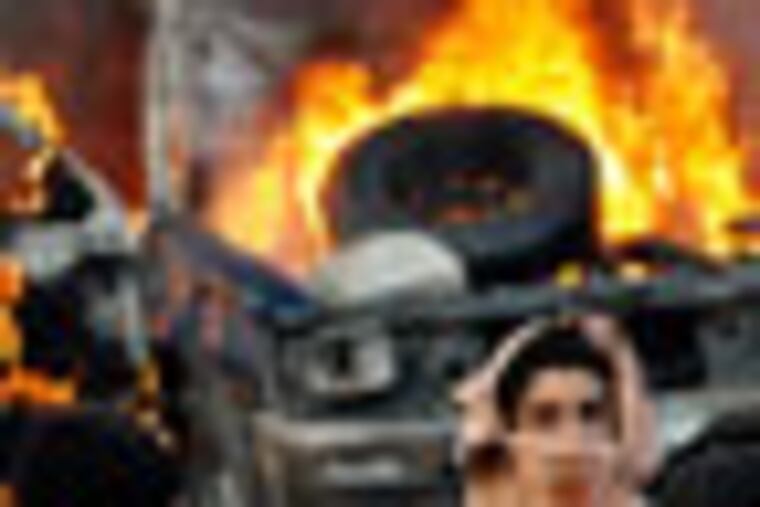U.S. orders evacuations in Tunisia and Sudan
CAIRO - The Obama administration ordered the evacuation of all but emergency U.S. government personnel, and all family members, from diplomatic missions in Tunisia and Sudan on Saturday and warned Americans not to travel to those countries.

CAIRO - The Obama administration ordered the evacuation of all but emergency U.S. government personnel, and all family members, from diplomatic missions in Tunisia and Sudan on Saturday and warned Americans not to travel to those countries.
The action came as leaders across the Muslim world took stock of their relationship with the United States, a major provider of aid and investment, and struggled to balance it with the simmering anger of their populations. In Sudan, the State Department order came after the government in Khartoum rejected a U.S. request to send a Marine antiterrorism unit to protect the embassy there, which came under attack by protesters Friday.
In Yemen, al-Qaeda in the Arabian Peninsula issued a statement urging more killings of U.S. diplomats, and the Yemeni parliament demanded that all foreign troops in the country be sent home, including roughly 50 U.S. Marines deployed to protect the embassy there. The U.S. military and CIA have been in Yemen for some time, in cooperation with the Yemeni government, as part of counterterrorism operations.
The decision to evacuate was the latest consequence of a week of anti-American rage across more than 20 countries in the Muslim world, although most were quiet Saturday. U.S. officials said they ordered the evacuations out of caution rather than knowledge of any specific threats. The United States does not have an ambassador assigned to Sudan but maintains a diplomatic presence there.
Saturday's pullback follows the evacuation of 50 U.S. diplomatic personnel from Libya, where Ambassador J. Christopher Stevens and three other State Department employees were killed Tuesday at the consulate in Benghazi.
In Egypt, after days of pressure from the United States, President Mohamed Morsi took decisive action Saturday against lingering protests near the U.S. Embassy, with police making arrests and clearing Tahrir Square of demonstrations whose cause Morsi had only days earlier endorsed. But he had to contend with continued pressure from ultraconservative Muslims and disaffected young people who had fought for days near the embassy.
Morsi had been in the middle of negotiating more than $1 billion in aid, debt forgiveness and U.S. investments when protesters, prodded by rage over an anti-Islam video that was made in the United States, stormed the embassy walls and pulled down and destroyed the American flag. The assistance talks have been subsumed by the days of protests near the embassy - some of which were called for by Morsi's own Muslim Brotherhood party.
But it is the once-repressed, ultraconservative Salafists who have proved the most complicated for Morsi to handle as he navigates his nation of 83 million people through a democratic transition that has freed citizens to be as religiously conservative and anti-American as they wish. The Salafist Nour party was one of the main sparks of the Tuesday protests in Cairo that presaged the regional conflagration, although Nour backed off when the situation turned violent and endorsed Saturday's sweep of Tahrir.
The Salafists' first taste of political power is toning down their rhetoric, some experts say. Salafists helped form a human chain in Tahrir Square on Friday to keep the most violent protesters away from security forces.
But for Morsi, attending to religious conservatives in the country will be a major consideration as his term unfolds.
"Now Salafists are calling him out and saying that he isn't the most fervent defender of the faith," said Shadi Hamid, an Egypt expert at the Brookings Doha Center. "That puts him in a bind."
Salafists who were long repressed under President Hosni Mubarak are now able to follow their strict faith openly. And after the revolution, many Salafists turned to politics after years of assiduously avoiding it. They were the second-largest bloc after the Muslim Brotherhood's Freedom and Justice Party in the now-dissolved parliament.
Though Salafists are a diffuse coalition, Morsi and his associates view them as major contenders.
Their influence is large enough that Morsi held back from condemning the assault on the U.S. Embassy in Cairo for days last week, until after a stern phone call from President Obama.
On Saturday, security forces finally cleared Tahrir Square, using tear gas and water cannons. The government made 220 protest-related arrests Saturday, according to news reports.